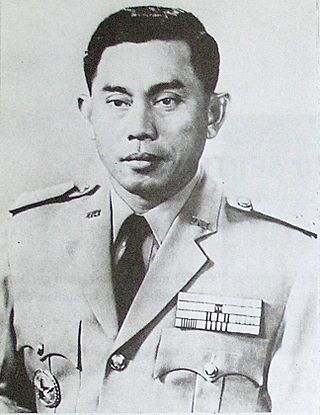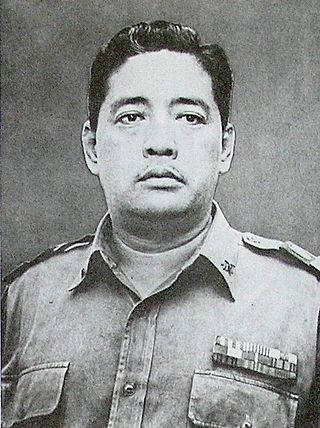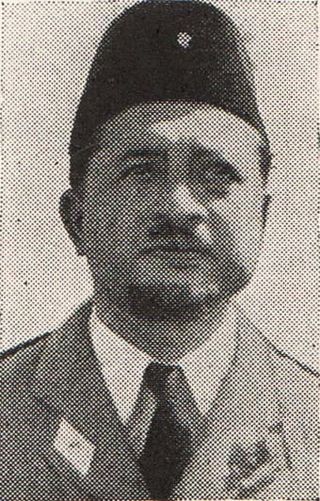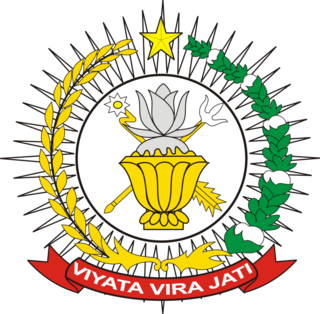
The Indonesian National Armed Forces are the military forces of the Republic of Indonesia. It consists of the Army (TNI-AD), Navy (TNI-AL), and Air Force (TNI-AU). The President of Indonesia is the commander-in-chief of the Armed Forces. As of 2023, it comprises approximately 400,000 military personnel including the Indonesian Marine Corps, which is a branch of the Navy.

A non-commissioned officer (NCO) is a military officer who does not hold a commission. Non-commissioned officers usually earn their position of authority by promotion through the enlisted ranks. In contrast, commissioned officers usually enter directly from a military academy, officer training corps (OTC) or reserve officer training corps (ROTC), or officer candidate school (OCS) or officer training school (OTS), after receiving a post-secondary degree.
Officer candidate or officer aspirant (OA) is a rank in some militaries of the world that is an appointed position while a person is in training to become an officer. More often than not, an officer candidate was a civilian who applied to join the military directly as an officer. Officer candidates are, therefore, not considered of the same status as enlisted personnel.

The Indonesian Army is the land branch of the Indonesian National Armed Forces. It has an estimated strength of 300,400 active personnel. The history of the Indonesian Army has its roots in 1945 when the Tentara Keamanan Rakyat (TKR) "People's Security Forces" first emerged as a paramilitary and police corps.
The Indonesian National Armed Forces (TNI) uses a simplified ranking system for the three branches of Indonesian Army, Indonesian Navy and Indonesian Air Force. Most of the ranks are similar with differences for the rank titles of the high-ranking officers. Exception exists, however, in the ranks of the service members of the Indonesian Marine Corps. While Indonesian Marine Corps is a branch of the Navy, the rank titles of the Marine Corps are the same as those of the Army, but it still uses the Navy's style insignia.

Pierre Andries Tendean was an Indonesian Army lieutenant. He was best known as a victim of the 30th September Movement (G30S) and posthumously awarded as revolution hero, later Indonesian national hero.

General Ahmad Yani was the Commander of the Indonesian Army, and was killed by members of the 30 September Movement during an attempt to kidnap him from his house.

Lieutenant General R. Soeprapto was the Second Deputy Commander of the Indonesian Army, and was kidnapped from his home in Jakarta by members of the 30 September Movement in the early hours of 1 October. He was later killed at Lubang Buaya.

General Gatot Soebroto was an Indonesian general who began his military career with the Royal Dutch East Indies Army (KNIL) and rose to be deputy Army chief-of-staff.

Komando Daerah Militer XIV/Hasanuddin is a military command area of the Military of Indonesia. It oversees the following provinces on Sulawesi island: South Sulawesi, Southeast Sulawesi and West Sulawesi.
Gatot Soebroto Central Army Hospital is a military hospital in Jakarta, Indonesia. The name of the hospital is derived from Gatot Soebroto, a National Hero of Indonesia. Established in 1819, the hospital is the main hospital for the Indonesian Army. The hospital also provides limited services for civilians.

The Military Academy is a service academy of the Indonesian Army, part of the Indonesian National Armed Forces Academy. Founded on the early stages of the Indonesian Revolutionary War and located in the city of Magelang in Central Java, its alumni form a professional officer corps for the army, with all Indonesian Army Chiefs of Staff since 1988 having graduated from Akmil.

General (Ret.) Mulyono is an Indonesian former general who previously served as the Chief of Staff of the Indonesian Army. He was appointed by President of Indonesia Joko Widodo in 2015, replacing Gatot Nurmantyo who became commander (Panglima) of the Indonesian National Armed Forces.

The Indonesian Army Command and General Staff College in Bandung, West Java, is a prominent graduate school for Indonesian Army and sister-service officers, inter-agency representatives, and international military officers. The college was established in 1951 in order to fulfill the demands for army officers that will pursue their armed forces career in commands and leadership. It has been commanded by Major General Anton Nugroho since 18 June 2020.

Indonesian Army Doctrine, Education and Training Development Command is an Indonesian Army Principal Command which is directly under the office of the Chief of Staff of the Army and located in Bandung, West Java. Its principal responsibility is the training of all service personnel of the Army to fulfill its primary responsibilities of national defense and civil-military cooperation in national development.
Main Regiments of the Military Area Commands are Indonesian training centers and regimental depots serving newly recruited enlisted personnel of the 15 Military Area Commands of the Indonesian Army. These regiments are the regional command's home base for recruiting and training of personnel within their areas of responsibility.

Lieutenant General (Ret.) Herman Asaribab was an Indonesian military officer. He served as the Commander of the 17th Military Regional Command/Cenderawasih from August 2019 to November 2020, before being promoted to Vice Chief of Staff of the Indonesian Army.
Frans Eddy Thanos was an Indonesian army officer who served as the General Secretary of the Army Staff from 1960 until 1962. He wrote several books during his career in the army and became a candidate for the People's Representative Council in the 1999 Indonesian legislative election.

The Reserve Component of the Indonesian National Armed Forces is the military reserve force of Indonesia, jointly managed under the General Headquarters of the Indonesian National Armed Forces and the Indonesian Ministry of Defense.















